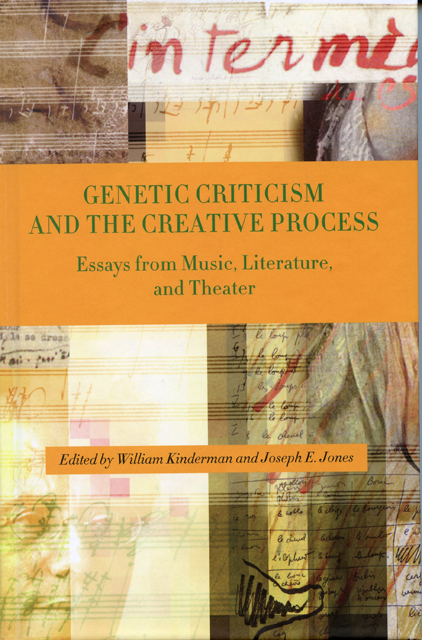Book contents
- Frontmatter
- Contents
- Acknowledgments
- Genetic Criticism and the Creative Process
- 1 Texts, Variants, and Variations: Evolving Contexts in Literature and Theater
- 2 Genetic Processes in Music: From Beethoven to Leroux
- 1 From Varieties of Genetic Experience to Radical Philology
- 2 Variant and Variation: Toward a Freudo-bathmologico-Bakhtino-Goodmanian Genetic Model?
- 3 The Genetic Record of a Voice: Variants in Barthes's Le Plaisir du texte
- 4 Can Genetic Criticism Be Applied to the Performing Arts?
- 5 “The hardy Laurel”: Beckett and Early Film Comedy
- 6 From Melodic Patterns to Themes: The Sketches for the Original Version of Beethoven's “Waldstein” Sonata, Op. 53
- 7 From Conceptual Image to Realization: Some Thoughts on Beethoven's Sketches
- 8 The Process within the Product: Exploratory Transitional Passages in Beethoven's Late Quartet Sketches
- 9 “They Only Give Rise to Misunderstandings”: Mahler's Sketches in Context
- 10 A Study of Richard Strauss's Creative Process: Der Rosenkavalier's “Presentation Scene” and “Schlußduett”
- 11 Genetic Criticism and Cognitive Anthropology: A Reconstruction of Philippe Leroux's Compositional Process for Voi(rex)
- Afterword
- Contributors
- Index
4 - Can Genetic Criticism Be Applied to the Performing Arts?
Published online by Cambridge University Press: 02 March 2023
- Frontmatter
- Contents
- Acknowledgments
- Genetic Criticism and the Creative Process
- 1 Texts, Variants, and Variations: Evolving Contexts in Literature and Theater
- 2 Genetic Processes in Music: From Beethoven to Leroux
- 1 From Varieties of Genetic Experience to Radical Philology
- 2 Variant and Variation: Toward a Freudo-bathmologico-Bakhtino-Goodmanian Genetic Model?
- 3 The Genetic Record of a Voice: Variants in Barthes's Le Plaisir du texte
- 4 Can Genetic Criticism Be Applied to the Performing Arts?
- 5 “The hardy Laurel”: Beckett and Early Film Comedy
- 6 From Melodic Patterns to Themes: The Sketches for the Original Version of Beethoven's “Waldstein” Sonata, Op. 53
- 7 From Conceptual Image to Realization: Some Thoughts on Beethoven's Sketches
- 8 The Process within the Product: Exploratory Transitional Passages in Beethoven's Late Quartet Sketches
- 9 “They Only Give Rise to Misunderstandings”: Mahler's Sketches in Context
- 10 A Study of Richard Strauss's Creative Process: Der Rosenkavalier's “Presentation Scene” and “Schlußduett”
- 11 Genetic Criticism and Cognitive Anthropology: A Reconstruction of Philippe Leroux's Compositional Process for Voi(rex)
- Afterword
- Contributors
- Index
Summary
As he began work on staging Sophocles's Electra, Antoine Vitez jotted down notes in which he considered the very feasibility of such a project. He stated that he wished to avoid two “ways” of “playing a Greek tragedy”: actualization and reconstitution. Vitez criticized actualization for being “an ingenuous demagogy,” a “negation … of the historical events to be stated,” and reconstitution for “asserting a gap between the work and us.”1 In an effort to move beyond this dilemma (“Neither actualization nor reconstitution. I am trying to find something else”), Vitez drew upon his experience as a translator by conceiving of staging as a translation process. In his use of the translation process as a model for the process of theatrical creation, Vitez offers an interesting entry point for a genetic investigation of this process. However, the equation of staging and translation raises a number of questions. If Sophocles's Electra is a work, what about its translations, by Paul Mazon,2 by Robert Pignarre,3 and by Antoine Vitez himself? Is the staging based on Vitez's translation an original work? What is the status of this work? Is it a product, comparable to a novel or a movie? How should the roles of the director, the actors, and the author be defined? How does a theatrical text—a script—relate to its performance on stage?
This chapter will address these questions through an examination of Electra’s three different stagings by Antoine Vitez, whose archives are deposited at the Institut Mémoire de l’Édition Contemporaine (IMEC):4 the first in Caen in 1966, the second in Nanterre and Ivry in 1971, the third at Paris's Théâtre National Populaire (TNP) in 1986. What typology of genetic traces can be constructed from this particularly rich material?
Vitez began by translating the Greek text himself, and thus the first traces are those of the translating process. From a semiotic point of view, the drafts of a translation are identical to those of a novel or an essay. The following brief example (fig. 4.1) is an excerpt from Vitez's drafts of the first translation in 1966.
Particularly interesting are Vitez's insights into this translating process as well as the analysis of his own practical translating work.
- Type
- Chapter
- Information
- Genetic Criticism and the Creative ProcessEssays from Music, Literature, and Theater, pp. 68 - 80Publisher: Boydell & BrewerPrint publication year: 2009
- 1
- Cited by



